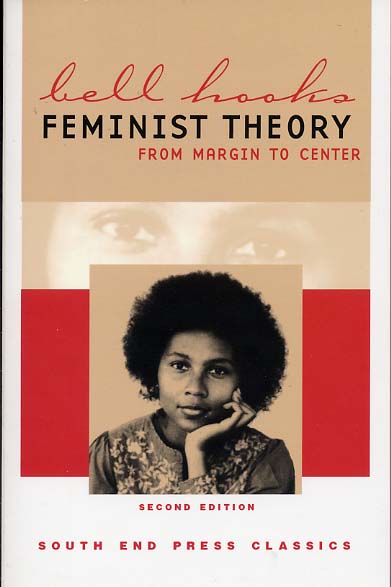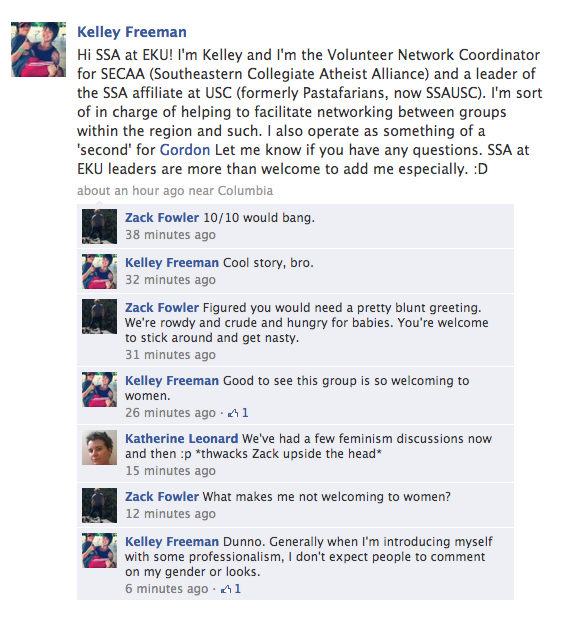For one of my classes this summer, I had write annotations/summaries for several books. I enjoyed many of them and I thought that the annotations might be useful for other people, so I will be posting them here. They’re somewhat rough, but considering how much everyone loves when someone at FtB posts about feminism, I doubt it matters.
—
This is one of the more important pieces of feminist writing, and it is very critical of the feminist movement at large. I think it is a useful resource for the skeptic/atheist movement because it addresses the problem of contention within a movement. The discussions and infighting within the feminist movement parallel very closely the kind of discussions and blindnesses and privileges on display with the atheist movement around questions of race and gender. She also addresses the problem of being a minority within a minority — something that women in the atheist movement deal with.
hooks, bell. Feminist Theory: From Margin to Center. Cambridge, MA: South End Press, 2000.
Question(s) Investigated: What is the role of black women in the feminist movement, and what has it been? What can be done to make feminism work towards ending all oppression, not just that of upper-class white women?
Time Period: Originally published in 1984, about the feminist movement in the 70s.
Geographic Region: US
Subjects studied: The intersection of gender, race, and class and their interaction with capitalism. The importance of including all people in social movements. Education, Parenting, and Violence.
Place in the literature: Considered a very important piece for pushing the feminist movement to be more inclusive of men, people of color, and different classes. hooks also argued against women being separatist and that sexism negatively impacted men as well. She criticized the movement for focusing on small goals and not systemic change. Essentially, she saw the limits of contemporary feminist theory and addressed them. Established hooks as a key figure in feminism.
Abstract:
The book begins immediately with her key argument, that feminist theory and feminism as a movement has been led by middle to upper-class white women who ignored the plight of poorer, non-white women. In her first paragraph, she criticizes Betty Friedan, not because white women didn’t need liberating, but because Friedan ignored the problems that the majority of women faced. hooks comes back to this later in the book, but one of her main arguments is that work is not liberating, it is oppressive, and the white women who sought careers to get out of the home ultimately found that work and capitalism were not fulfilling, as lower class women who had always had to work already knew.
She goes on to talk about how not everyone is oppressed equally, and it has been the least oppressed women who have set the goals and tone of feminism. “Being oppressed means the absence of choices. It is the primary point of contact between the oppressed and the oppressor. Many women in this society do have choices…” (5)
White feminists have ignored the needs and causes of black women or treated black women with contempt, and so black women have not been pushed away from the movement. Black women are the only group that has no “other” – black men and white women both have privilege over black women (16).
One of the main problems with feminism has been its willingness to accept small victories rather than to push for large change. hooks argues that “society is more responsive to those ‘feminist’ demands that are not threatening, that may even help maintain the status quo” and reforms often reinforce “capitalist, materialist values (illustrating the flexibility of capitalism) without truly liberating women economically” (23). The movement cannot be about small, personal goals, but about changing ideology.
Minority women often reject the feminist movement in response to the white bourgeois leaders. hooks’ main argument is that capitalism supports an oppressive paradigm generally and being a feminist shouldn’t mean excluding other fights against oppression. In other words, feminism should be one part of a broader anti-oppression ideology. The system hurts everyone.
There is no “hierarchy of oppression” but “[s]exist oppression is of primary importance not because it is the basis of all other oppression, but because it is the practice of domination most people experience…” (36). Sexist oppression occurs within family units, the hierarchy of sexes can be introduced before exposure to people of different classes or races happens. Feminists have argued for the elimination of the family unit and that is problematic for black women, who get a great source of love and support that they cannot get from institutions richer, white women have access to (39).
The idea of sisterhood of women is important, but the white bourgeois version insists that all women are equal, while hooks believes the movement must learn to accept and embrace differences and except that there is no sameness (44). They must also drop the victim mentality (45). The rest of the chapter rehashes this idea in various ways.
(From pages 54 – 67 there is a very interesting discussion on the idea of minorities within minority movements. The discussions and infighting within the feminist movement parallel very closely the kind of discussions and blindnesses and privileges on display with the atheist movement around questions of race and gender.)
Chapter 5 focuses on how important it is to include men in the feminist movement and how sexism hurts men as well as women. In the feminist movement, there has been some push for complete separation of women from men, which is neither realistic or possible, relationships between women and men are important to many women (79).
Chapter 6 focuses on power and how white bourgeois women have focused on increasing the power that women have rather than examining how problematic power is because it depends on dominating others (85).
Chapter 7 goes back to the idea that work in a capitalist society is not necessarily rewarding and is often exploitative and that white women insisting that working was a key to liberation made no sense to the poor women who were not liberated and already had work. There needs to be a new system and women need to learn not to devalue their own work and low-wages are considered a sign of personal failure in this culture (105).
Chapter 8 introduces the importance of education and how many poor women and many people of color are not literate so the feminist focus on transmitting ideas through writing necessarily was exclusive (109). Although the feminist movement has been interested in education, it has been interested in higher education not teaching basic skills like literacy. There is also a tendency in black feminists to be anti-intellectual, to think that theory doesn’t matter, while white feminists in the academy often neglect to understand real world problems when they create theory, both sides need to learn to embrace the other.
Chapter 9 discusses the feminist movement’s attempt to end domestic violence, which is a way of establishing dominance. Related closely to the previous chapters on power and on how sexism hurts men, this chapter focuses on how economic exploitation makes men feel powerless despite the fact that they are told they should be powerful (118-119). They take the resulting frustration out on their home life rather than at work. The entire culture is violent, including women.
Chapter 10 discusses parenting and the movement of feminism away from dismissing motherhood as something that stops women from achievement towards embracing it. This shift has made black women feel more welcome because family life is very important to them. The problem now is that motherhood is being romanticized when the reality is that men still do not contribute equally and society as a whole doesn’t provide infrastructure for taking care of children – children need a community and are not individual possessions (145).
Chapter 11 is about sexuality and sexual freedom. The feminist movement was successful in creating a world in which women could be sexual but didn’t remove the stigma that came with women who were openly sexual (151). It also didn’t remove heterosexism – the lesbians in the early feminist movement were known as the “lavender menace” (152-153).
Resources used: There is a very long bibliography, it focuses heavily on works written within 10 years of the publishing of this work. Much of what she cites is to point out flaws in seminal feminist works. Key works cited, in style of book:
Friedan, Betty. The Feminine Mystique. New York: W. W. Norton Company, 1963.
Brown, Rita Mae. “The Last Straw,” in Class and Feminism. Eds. Charlotte Bunch and Nancy Myron. Baltimore: Diana Press, 1974, pp. 14-23.
Barber, Benjamin. Liberating Feminism. New York: Dell, 1975.
Greer, Germaine. The Female Eunuch. New York: McGraw-Hill, 1971.
Boggs, Grace Lee and James Boggs. Revolution and Evolution in the Twentieth Century. New York: Monthly Review Press, 1974.
Morrison, Toni. “What the Black Woman Thinks about Women’s Lib,” The New York Times Magazine, August 22, 1971.
Spelman, Elizabeth. “Theories of Race and Gender/The Erasure of Black Women,” Quest, Vol. V, No. 4 (1982), pp. 36-62.
Schechter, Susan. Women and Male Violence: The Visions and Struggles of the Battered Women’s Movement. Boston: South End Press, 1982.




